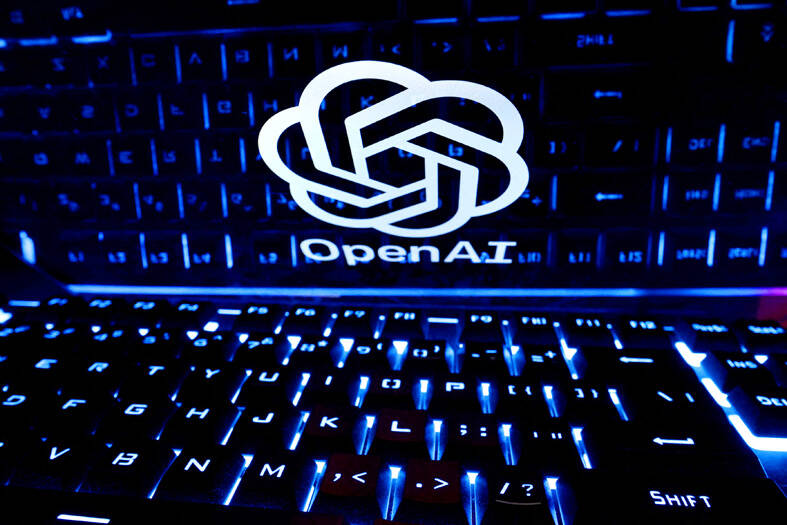ChatGPT-maker OpenAI is getting into the voice assistant business and showing off new technology that can clone a person’s voice, but says it would not yet release it publicly due to safety concerns.
The artificial intelligence (AI) company on Friday unveiled its new Voice Engine technology, just more than a week after filing a trademark application for the name. The company claims that it can recreate a person’s voice with just 15 seconds of recording of that person talking.
OpenAI said it plans to preview it with early testers, “but not widely release this technology at this time” because of the dangers of misuse.

Photo: Reuters
“We recognize that generating speech that resembles people’s voices has serious risks, which are especially top of mind in an election year,” the San Francisco-based company said in a statement.
In New Hampshire, authorities are investigating robocalls sent to thousands of voters just before the presidential primary that featured an AI-generated voice mimicking US President Joe Biden.
A number of start-ups already sell voice-cloning technology, some of which are accessible to the public or for select business customers such as entertainment studios.
OpenAI said its early Voice Engine testers have agreed to not impersonate a person without their consent and to disclose that the voices are AI-generated.
The company, best known for its chatbot and the image-generator DALL-E, took a similar approach in announcing, but not widely releasing, its video-generator Sora.
However, a trademark application filed on March 19 shows that OpenAI likely aims to get into the business of speech recognition and digital voice assistant. Eventually, improving such technology could help OpenAI compete with the likes of voice products such as Amazon.com Inc’s Alexa.

The US dollar was trading at NT$29.7 at 10am today on the Taipei Foreign Exchange, as the New Taiwan dollar gained NT$1.364 from the previous close last week. The NT dollar continued to rise today, after surging 3.07 percent on Friday. After opening at NT$30.91, the NT dollar gained more than NT$1 in just 15 minutes, briefly passing the NT$30 mark. Before the US Department of the Treasury's semi-annual currency report came out, expectations that the NT dollar would keep rising were already building. The NT dollar on Friday closed at NT$31.064, up by NT$0.953 — a 3.07 percent single-day gain. Today,

‘SHORT TERM’: The local currency would likely remain strong in the near term, driven by anticipated US trade pressure, capital inflows and expectations of a US Fed rate cut The US dollar is expected to fall below NT$30 in the near term, as traders anticipate increased pressure from Washington for Taiwan to allow the New Taiwan dollar to appreciate, Cathay United Bank (國泰世華銀行) chief economist Lin Chi-chao (林啟超) said. Following a sharp drop in the greenback against the NT dollar on Friday, Lin told the Central News Agency that the local currency is likely to remain strong in the short term, driven in part by market psychology surrounding anticipated US policy pressure. On Friday, the US dollar fell NT$0.953, or 3.07 percent, closing at NT$31.064 — its lowest level since Jan.

The New Taiwan dollar and Taiwanese stocks surged on signs that trade tensions between the world’s top two economies might start easing and as US tech earnings boosted the outlook of the nation’s semiconductor exports. The NT dollar strengthened as much as 3.8 percent versus the US dollar to 30.815, the biggest intraday gain since January 2011, closing at NT$31.064. The benchmark TAIEX jumped 2.73 percent to outperform the region’s equity gauges. Outlook for global trade improved after China said it is assessing possible trade talks with the US, providing a boost for the nation’s currency and shares. As the NT dollar

The Financial Supervisory Commission (FSC) yesterday met with some of the nation’s largest insurance companies as a skyrocketing New Taiwan dollar piles pressure on their hundreds of billions of dollars in US bond investments. The commission has asked some life insurance firms, among the biggest Asian holders of US debt, to discuss how the rapidly strengthening NT dollar has impacted their operations, people familiar with the matter said. The meeting took place as the NT dollar jumped as much as 5 percent yesterday, its biggest intraday gain in more than three decades. The local currency surged as exporters rushed to